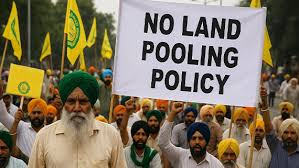Listen To This Post
HARISH MANAV/THE NEWS DOSE
Chandigarh, August 9 — Bowing to mounting political backlash and legal setbacks, the Punjab government on Monday formally withdrew its contentious land pooling policy, which sought to acquire a staggering 65,533 acres across the state, nearly 72% of it in Ludhiana district.
The policy’s abrupt rollback came just days after the Punjab and Haryana High Court stayed its implementation, sharply criticising the Aam Aadmi Party (AAP) government for “notifying the policy in haste” without carrying out mandatory environmental and social impact assessments.
According to senior officials, the decision to scrap the scheme was taken following a series of intense internal consultations over the weekend. A meeting of bureaucrats involved in drafting the policy was reportedly convened with AAP’s top leadership two days ago. On Monday morning, senior ministers, MLAs, and party strategists huddled again — and with consensus emerging that the scheme had become a political liability, the leadership opted to pull the plug just hours before the official announcement.
A Policy Under Fire from the Start
Announced in June this year, the policy aimed to pool land parcels from farmers and landowners for planned industrial and infrastructural development. Of the targeted 65,533 acres, 46,861 acres lay in Ludhiana, earmarked for large-scale industrial projects.
However, almost immediately after its unveiling, the scheme faced a barrage of criticism from opposition parties, farmer unions, and even sections within AAP itself. Farmer leaders accused the government of trying to bypass fair compensation norms and erode agricultural livelihoods. Political rivals — from Congress to the Shiromani Akali Dal — termed it “anti-farmer” and “pro-corporate.”
What deepened the political damage was dissent from within. Several AAP legislators reportedly conveyed to the leadership that the move had alienated the party’s rural base, urging Chief Minister Bhagwant Mann’s government to hold consultations with stakeholders before proceeding.
Court Intervention Seals Fate
The High Court’s stay order last week proved to be the final blow. In its remarks, the bench reprimanded the state government for failing to engage in due diligence, observing that any such policy must undergo rigorous environmental and social impact assessments to ensure fairness and sustainability.
The combination of judicial censure, intensifying farmer protests, and internal unease ultimately forced the government’s hand.
Political Implications
Analysts say the U-turn is a setback for the Mann government, which had been positioning the land pooling policy as a catalyst for industrial investment and job creation. The withdrawal may placate protesting farmers for now, but it also raises questions about the government’s planning process and political foresight.
With Punjab’s political landscape heavily influenced by agrarian concerns, the episode serves as a reminder that land policies in the state remain among the most politically sensitive decisions a government can make.















